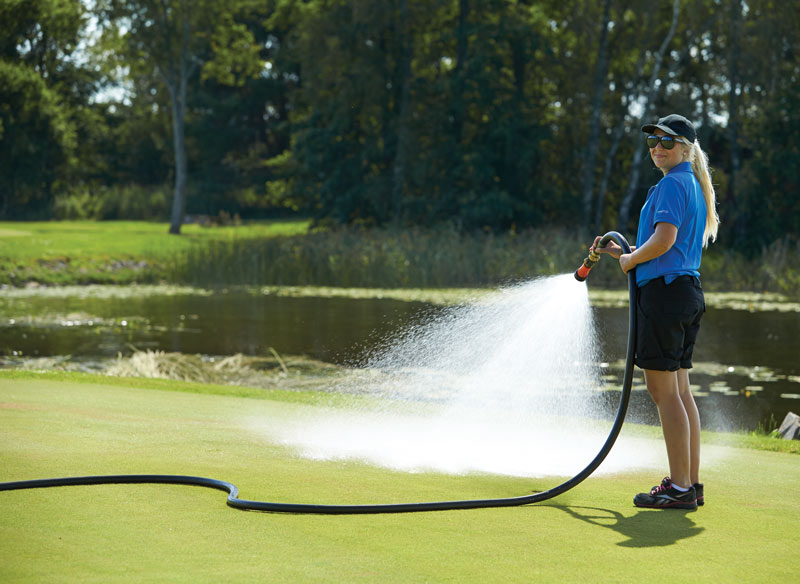
A better understanding of the professional obstacles facing women in turf can help the golf course management industry in its quest to increase diversity and attract top talent. Photo by Paul Severn
The subject of women in turfgrass has increasingly gained attention from industry professionals as women continue to prove themselves as vibrant leaders and turfgrass managers. Female leaders in the industry have recently been featured in trade magazines and at women’s events (for example, the Ladies Leading Turf gathering at the Golf Industry Show) with the goal of empowering other women to pursue careers in the turfgrass industry. However, women remain a minority in the turfgrass industry and represent a drastically smaller percentage of labor proportional to the global female workforce.
As the labor shortage in the industry continues to intensify, attracting and retaining qualified individuals is of great importance. Focused recruiting methods tailored to address the challenges and opportunities for women may increase female engagement in turfgrass and ease labor concerns. However, a scientific understanding of what motivates and encourages women to enter the industry and take on leadership roles is lacking.
Research about these goals has been conducted in other agricultural sectors and would provide valuable information for recruitment in the turfgrass industry. Therefore, researchers at the University of Tennessee in the Department of Agricultural Leadership, Education and Communications pursued a study to assess how women have sustained their leadership roles in the turfgrass industry.
Lived experiences of female leaders in turf
Thirteen women from diverse backgrounds were identified as industry leaders and interviewed to gain a broad understanding of the lived experiences of women in turfgrass. This research was approved by the University of Tennessee’s Institutional Review Board to ensure the rights and welfare of human subjects were upheld. To protect all parties participating in this study, the identities of the interviewed women and their affiliated workplaces remain confidential.
The interviewed women were from three countries, including nine states in the U.S. and three Canadian provinces. The women had six to 30-plus years of experience working in turfgrass in leadership roles such as golf course superintendent, assistant golf course superintendent, graduate student, athletic field manager or assistant athletic field manager. Additionally, many of the women held leadership roles in service to the national or local chapters of GCSAA, the Sports Turf Managers Association, or the Canadian Golf Superintendents Association. Eight of the women worked in golf turf, and five in sports turf. Transcriptions of interviews were analyzed and used to develop themes intended to encompass the views and backgrounds of all 13 women.
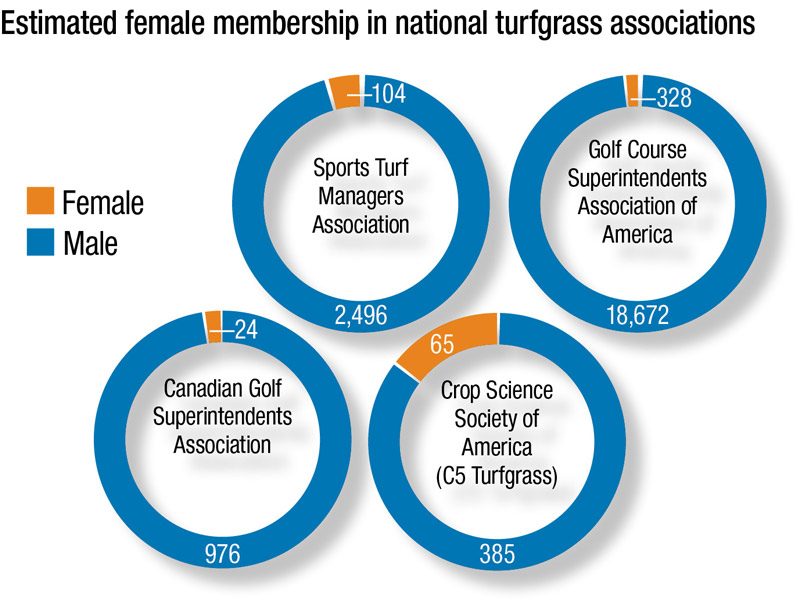
All 13 women described their upbringing as a childhood involved in playing sports and/or engaging in outdoor activities. While 11 of the women started in a career path other than turfgrass, all 13 expressed passion for their current work. An importance was placed on education, with 12 of the 13 having a formal education in turfgrass science or management. Analysis of all interviews revealed three main themes: leadership and mentorship, challenges, and opportunities for growth.
Leadership and mentorship
The women interviewed shared similar leadership styles and mentorship experiences. Open leadership styles were the most common described by participants. Most of the women self-identified as hands-on leaders who lead by example and who make an effort to work alongside their crews, with an emphasis placed on teaching.
The most common theme among leadership styles was that of empowering employees to find their own way. “My outlook is, if the end product is the same and it’s the same amount of quality and you got there a different way than I told you to get there, then I’m fine. So, I like seeing innovation and people who change processes to be more efficient but achieve the same outcome,” said one of the women interviewed.
Women engaging in this leadership approach believe it provides an opportunity for employees to understand why tasks are completed, and it permits employees to learn from failure. One participant stated, “That’s my leadership; that’s what I try to do: Let everybody see what it’s really like, because they’re eventually, hopefully, going to take over my position one day.”
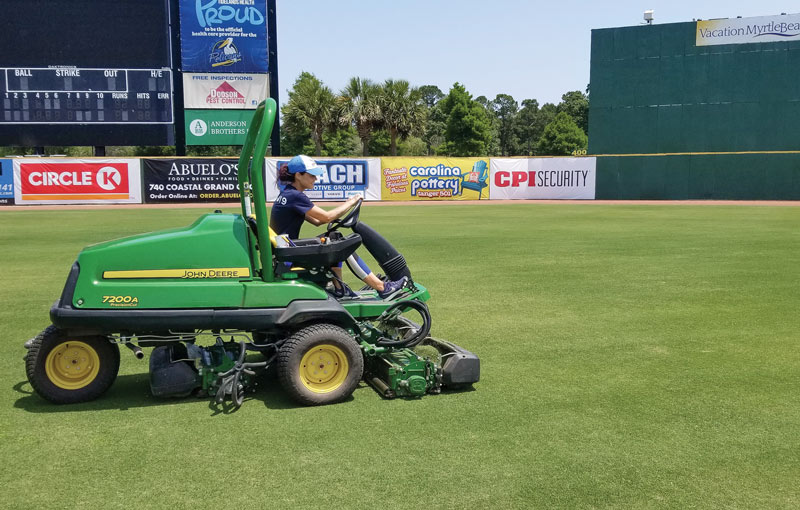
Growing up on a farm in Alabama helped prepare Tisa Blackhurst for her current role as assistant sports turf manager for the Myrtle Beach (S.C.) Pelicans minor league baseball team. Photo by J.C. Blackhurst
The women also noted the importance of communication and compassion in leadership. Communication established ownership for employees, which improved work culture. Multiple women discussed the influence of relationship-building on communication: “I think in our genetic makeup, women tend to be more empathetic and want to talk about their feelings and create that relationship. And men sometimes are like, ‘I just want to get the job done. I don’t want to go through this touchy-feely stuff; I just want to get the job done.’”
Additionally, the participants in this study placed emphasis on employee appreciation. One woman said, “I make sure I say thank-you at the end of the day to everybody for what they did, every single day.” Another stated, “Following a budget is very strict to me, but I’m willing to take away from other things in order to make the staff happy, because in my opinion, if you don’t have a happy staff, you’re not going to get as good a product.”
Many of the women we surveyed discussed the significance of mentorship in their own journeys to leadership, as well as their desire to mentor: “If you invest in people, they will start to invest in you.” Mentorship was considered from the point of view of both the mentee and mentor. “It’s messy, because the person has to learn the lessons without you spoon-feeding them ... sometimes there are tears involved. It’s about support. It’s about providing a safe space for people to learn and grow,” one woman shared.
When asked what makes a mentor relationship good, respondents indicated successful mentorship takes time to foster. One contributor commented, “I think a good mentor is just somebody that’s there to understand you and to make you the best (version of) you, not make you the best (version of) them.” Similarly, another shared, “I think successful mentorship looks like somebody giving somebody else a chance no matter what.” All 13 women agreed that mentorship is essential to encourage others to enter the turfgrass industry.
Challenges for women in turf
While all the participants in the study generally maintained a positive view of their experiences in the turfgrass industry, they also discussed challenges unique to women. Most of the issues described involved sexism, difficulty building a family, and inappropriate peer conduct. The women described instances of peers afraid of the change a female on the crew would bring, overcoming assumptions of women having physical limitations or limited turfgrass knowledge, and working harder than male counterparts to prove themselves.
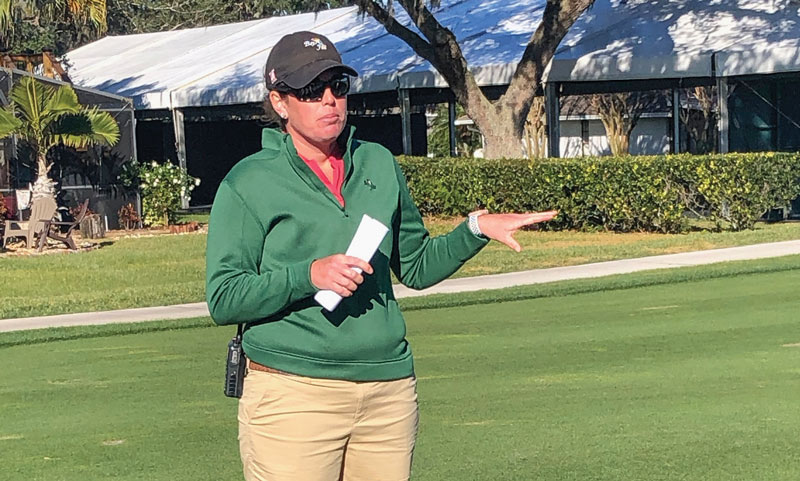
Alex Hills is first assistant superintendent at Bay Hill Club and Lodge in Orlando, Fla., which hosts the annual Arnold Palmer Invitational. Photo by Scott Hollister
One participant described the need for women to prove themselves: “The second golf course superintendent I worked for sat me down one day, and he said, ‘If you want to get into turf, there are some things that I think you need to accept and not necessarily like going into this field. You’re going to have to do it better, be smarter, be more savvy and be thicker-skinned just to get the same respect that the guys get just walking in the door.’”
Editor’s note: Learn more about women blazing trails in the turf industry and read more of their stories and insights in GCMOnline.com’s women in turf collection.
Women also described being mistaken for someone’s wife, a waitress or the beer-cart attendant instead of being recognized as a turfgrass manager at conferences and at work. “I struggled a lot because I was so tired of being mistaken for somebody’s wife. Being asked whose wife I was or whose fiancée I was, girlfriend I was, was a punch to the gut every single time. I’m not here with a man. I’m here because I work here. It’s hard to walk through that entire event center, and everybody’s looking at you funny because you’re one of six girls in the area, and it’s awkward,” said one of the women who volunteered for the study.
Many of those interviewed expressed having difficulties in maintaining spousal relationships and raising children. Only four of the women in the group were married, and five had children. One said, “I am terrified to get pregnant, as I feel I would be worked out of my position.” Another said that a career in turfgrass forces a choice between work and family: “I didn’t really have a desire to have kids myself, because I just felt I could not split my time between having a family and having the career that I wanted to have. These turf management careers are a lifestyle and don’t mix well with inclusion of a lot of other things.”
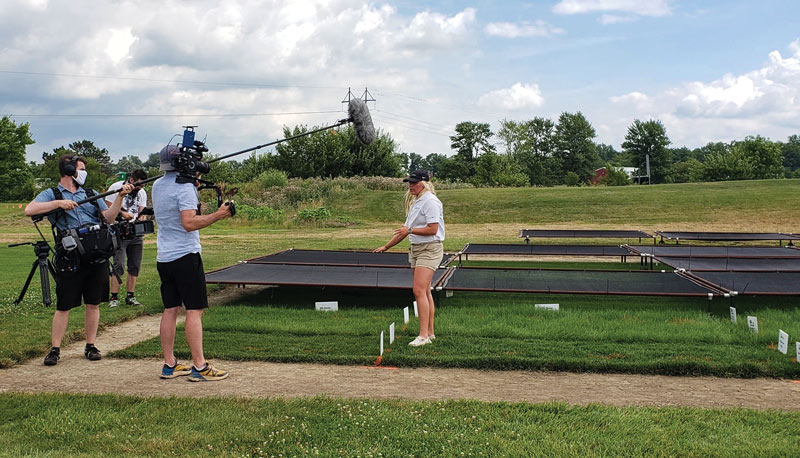
Cassie Reed, a turfgrass specialist at The Scotts Co., participates in a company video shoot, discussing shade research she carried out for her master’s degree at Ohio State University. Photo by Matthew Koch
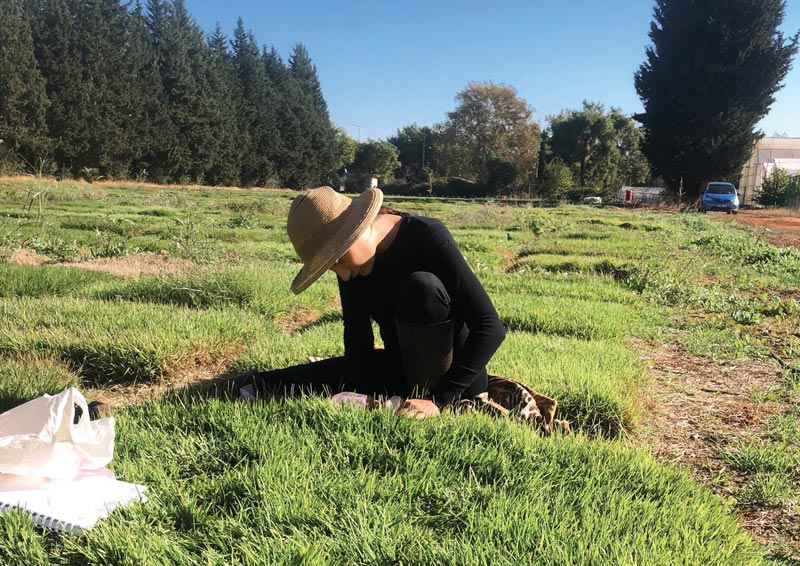
Graduate student Deniz Subasi is focusing on zoysiagrass breeding for her master’s degree at Akdeniz University in Antalya, Turkey. Photo courtesy of Deniz Subasi
Members of the study group also struggled to overcome issues surrounding inappropriate behavior and misconduct at work. There was a feeling that one must be a tomboy to fit in and be respected. They described being paranoid about their clothing choices for fear they would be asked on dates or approached by others in the industry. Many women described their discomfort with being pursued romantically at work, at conferences and on Twitter. Additionally, they reported limited work opportunities compared with their male counterparts, and men assuming that women were handed opportunities rather than working for them.
Some interviewees recounted not being taken seriously by their peers: “Getting people to take you seriously and getting them to understand you are qualified, capable, and good at your job. And then what was always interesting was the salesman, those poor salesmen, who would come to visit me. They go to a guy and they talk about guy stuff, right? The stuff that’s not appropriate to talk to a woman about. They would come into my office, and they wouldn’t know what to say.”
The women who were surveyed said discussing challenges is not only important to foster change, but also to show other women who are currently in the industry that they are not alone. One woman expressed her desire for support: “I need some kind of camaraderie from my fellow females in this industry regardless of if it’s sports or golf. Tell me, how do you move on? They can’t answer that question for me, but it’d be nice to know, ‘Hey, I was there too before. This happened to me, so you’re not alone.’ Just that feeling.”
Opportunities for growth
Discussion of challenges faced by women in the turfgrass industry has led to the development of suggested courses of action for both the women in the industry and for the industry itself to improve the current culture. Women are encouraged to continue professional development by pursuing education and attending events for women in turf.
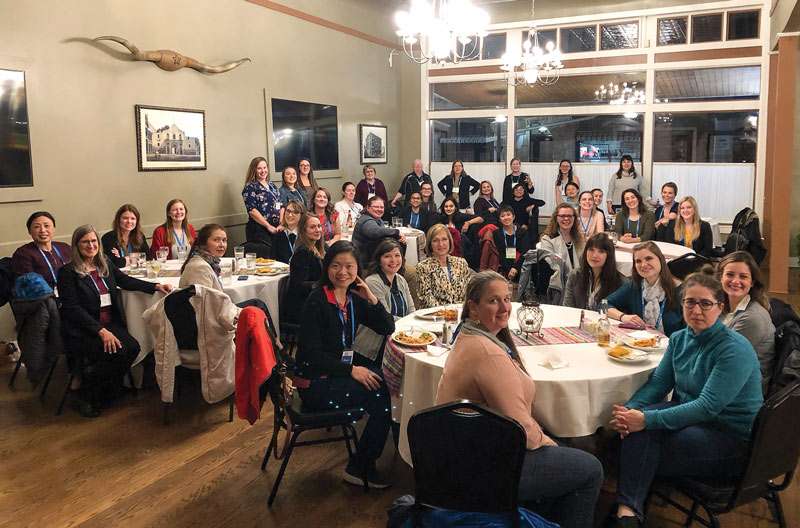
“Women in Turf” is an informal association of women in turfgrass science, in both academia and industry, who meet annually to offer moral support, advice and good company. Their most recent meeting was in San Antonio in 2019. GCM staff photo
One woman summarized her growth in the industry by expressing, “I like to describe my weaknesses rather in the terms of opportunity to grow and learn. I enjoy always trying to improve myself and learn new skills.” Women can also find learning and leadership opportunities through local association chapters and national programs such as GCSAA’s Grassroots Ambassador and EXCEL Leadership programs.
Additionally, participation in events dedicated to women in turf may enhance the experience of those who participate. Many women noted other women in the industry serve as their support in tough times: “Right now, because of the women-in-turf events, I’ve had the absolute privilege of meeting a group of amazing women who support each other and are always there to ask questions or bounce ideas off! Between Twitter, texting and WhatsApp, we’ve been able to stay pretty connected!” Similarly, another woman commented, “It’s definitely given us a platform — not saying that we’re special, but sometimes the women just need to talk to other women.” Such relationship-building and networking with other women can foster a stronger community of belonging.
Editor’s note: Want to hear more? GCMOnline.com editor Megan Hirt chats with three women in turf — a superintendent, assistant and researcher — about overcoming on-the-job obstacles, lessons learned, and empowering women in the industry in episode 25 of the GCSAA Podcast.
The turfgrass industry can become more inclusive. Regarding women-in-turf events, one woman said, “There were a lot of guys that were angry that this was happening and were confused on why women in turf needs to be a movement and why we need our own separate seminars, which is a lack of understanding. It’s partly to network to get together, to get to know each other. But these seminars are generally bringing a female in a male-dominated industry to come and talk and explain their stories.” These events provide women the opportunity to network with each other and bring light to challenges they face that need to be addressed.
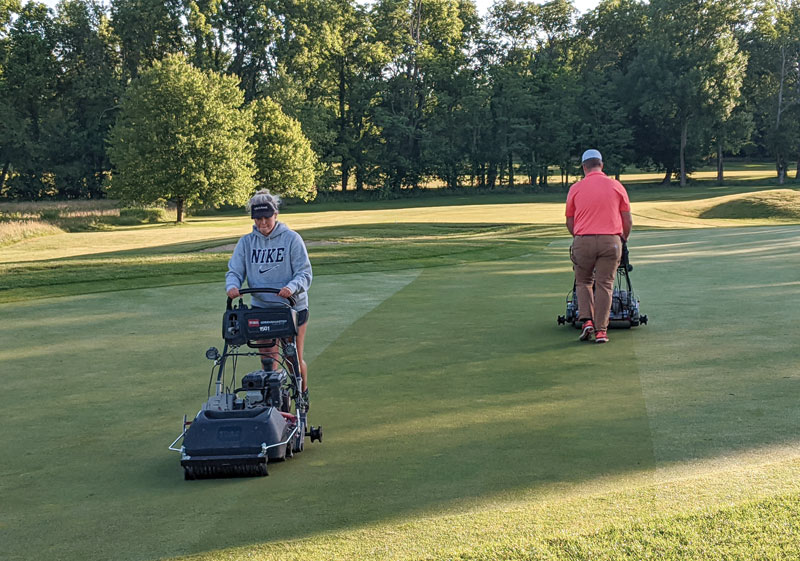
Now a student in biomedical engineering at Purdue University, Kaitlyn Dougherty (left) was one of three high school seniors who proved capable members of the grounds crew at Otter Creek Golf Course in Columbus, Ind. Photo by Brent Downs
Members of the turfgrass industry should also be mindful of speaking out on behalf of others if misconduct is observed. Some of the women interviewed emphasized the importance of keeping others accountable, and multiple women shared their gratitude for industry leaders and management who have been supportive. One woman said, “I have this overwhelming feeling perceptions and ideals within the industry need to be changed. Wanting to create opportunity for those of all backgrounds, races, sex, (it) doesn’t matter, to get involved in the stewardship of turfgrass management. Breaking down old stereotypes and pushing for an inclusive future.”
Conclusions
Although many of the 13 women interviewed felt it important for women considering working in turfgrass to understand the obstacles they might face, all were passionate about their profession and enthusiastic about encouraging others to take on the challenge.
Asked to give a piece of advice to other women already in or contemplating entering the industry, the women echoed sentiments similar to “Just do it.” Women also suggested that others considering a career in turf should “expect the challenges” and “be strong, confident and yourself.” One woman said, “Any woman entering this industry at this time is going to be a trendsetter, right? You are blazing a trail for young women to follow you. And part of the challenge of being a trailblazer is that there are uncomfortable situations. And you have to learn how to navigate those with integrity and dignity.”
The women we interviewed were hopeful their shared experiences would promote change and inspire others, of any gender, to become a part of the turfgrass industry. All of them explained the importance of inclusivity in the industry. As the number of women working in turfgrass continues to increase slowly, acceptance by peers is key to retaining them. A movement to understand each other is positive. At the end of the day, everyone just wants to grow grass.
Devon Carroll is a master’s candidate in agricultural leadership, education and communications concurrently enrolled as a doctoral student in plant, soil and environmental science concentrated in turfgrass weed science at the University of Tennessee. Carrie Stephens is a professor of leadership in the Department of Agricultural Leadership, Education and Communications in the Herbert College of Agriculture at the University of Tennessee.